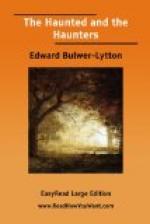I
In the greenest of our valleys,
By good angels
tenanted
Once a fair and stately palace—
Radiant palace—reared
its head.
In the monarch Thought’s
dominion—
It stood there!
Never seraph spread a pinion
Over fabric half
so fair.
II
Banners yellow, glorious,
golden,
On its roof did
float and flow;
(This—all this—was
in the olden
Time long ago)
And every gentle air that
dallied,
In that sweet
day,
Along the ramparts plumed
and pallid,
A winged odour
went away.
III
Wanderers in that happy valley
Through two luminous
windows saw
Spirits moving musically
To a lute’s
well tuned law,
Round about a throne, where
sitting
(Porphyrogene!)
In state his glory well befitting,
The ruler of the
realm was seen.
IV
And all with pearl and ruby
glowing
Was the fair palace
door,
Through which came flowing,
flowing, flowing
And sparkling
evermore,
A troop of Echoes whose sweet
duty
Was but to sing,
In voices of surpassing beauty,
The wit and wisdom
of their king.
V
But evil things, in robes
of sorrow,
Assailed the monarch’s
high estate;
(Ah, let us mourn, for never
morrow
Shall dawn upon
him, desolate!)
And, round about his home,
the glory
That blushed and
bloomed
Is but a dim-remembered story
Of the old time
entombed.
VI
And travellers now within
that valley,
Through the red-litten
windows, see
Vast forms that move fantastically
To a discordant
melody;
While, like a rapid ghastly
river,
Through the pale
door,
A hideous throng rush out
forever,
And laugh—but
smile no more.
I well remember that suggestions arising from this ballad, led us into a train of thought wherein there became manifest an opinion of Usher’s which I mention not so much on account of its novelty (for other men[1] have thought thus), as on account of the pertinacity with which he maintained it. This opinion, in its general form, was that of the sentience of all vegetable things. But, in his disordered fancy, the idea had assumed a more daring character, and trespassed, under certain conditions, upon the kingdom of inorganisation. I lack words to express the full extent, or the earnest abandon of his persuasion. The belief, however, was connected (as I have previously hinted) with the grey stones of the home of his forefathers. The conditions of the sentience had been here, he imagined, fulfilled in the method of collocation of these stones—in the order of their arrangement, as well as in that of the many fungi which overspread them, and




